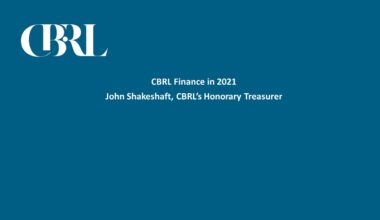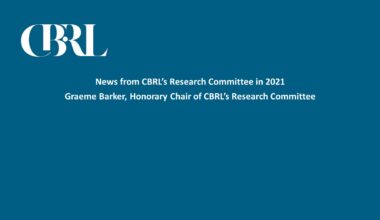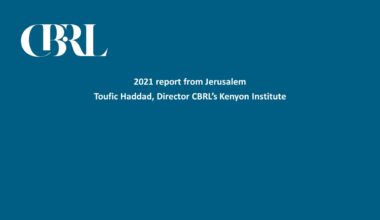2021 report from the Director and report from Amman
Carol Palmer, CBRL Director and Director of CBRL Amman
During the pandemic when movement has been very restricted, we’ve used the time to do a roots and branch review of CBRL and one of the things we’ve reviewed with our trustees are CBRL’s vision, mission and values – these are all now on the website.
We continue to cover the core activities that are part of our constitution, producing and disseminating research, investing in the most promising emerging scholars and scholarship, and facilitating especially UK and Levantine academic partnership at an institutional and individual level. We also want to contribute to shaping debate and understanding through informed public outreach and education.
Research
We spent a lot of time this year reviewing our research themes which can now be found on the website. We’ve tried to frame the research themes to encompass as broad a community as possible, as well as to foster interdisciplinarity. We move forward encouraging researchers and those engaging with us to contribute to these themes.
Due to Covid, we’ve delayed the deadline for completion of research for those awarded in 2020 until 2022. This year we ran our grant round later than usual, closing the call and allocating funding at the end of this year (2021). Next year we hope to announce our funding in spring and award grants in the summer. We’ve reformulated our grant portfolio incorporating more opportunities for researchers in the Levant as well as for postgraduates. This activity lies outside of the remit of what we are permitted to cover through our British Academy grant, so we continue to fundraise to cover these awards.
This year’s revised grant scheme emphasised collaboration and opportunities for a wider group of scholars. We’ve also introduced a new grant entitled ‘Networking partnership award’, again, under the theme of collaboration and cooperation.
Outreach and events
During Covid we have run many online events – 27 – since we launched webinars in May 2020. All of these are available on our YouTube channel as well in Podcast form on our SoundCloud. We’ve also been adding our back catalogue of lectures to these channels so please do take a look.
Back in April we launched our new website which we continue to enrich. We have seen users not only from the UK and the English-speaking world, but a significant number from the region, Jordan features highly, and from Europe – Germany and France – but also, we have users further afield in India, China and Brazil. We hope that website figures increase as we continue to produce content. Please do check the website regularly to hear about new activities.
Publications
We produce two journals – Levant (archaeology and cultural heritage) and Contemporary Levant. We’ve just produced volume 53 issue 2 of Levant. You may be aware that we’ve had recent delays in producing Levant but with many thanks to Levant’s new Editor-in-chief, Caroline Middleton, we’re now up to date. Contemporary Levant is edited by Sarah Irving who’s doing a fabulous job and volume 6 issue 2 has recently come out. Earlier this year there was a Contemporary Levant special issue on Eastern Christianity. For the Bulletin, issues 2018-19 and 2020 are now available online as PDFs. These will be the last issues produced in this format as more content is becoming available online throughout the year.
Plans are well advanced to make CBRL’s existing monographs available on JSTOR as open access. Those that are currently on the Archaeology Data Service (ADS) will be moved to JSTOR.
Access to knowledge
A key part of CBRL’s strategy is to improve access to knowledge. In 2020 we ran a library review – thank you to all of you who contributed. From that we have made a commitment to invest more in our libraries including: the collections; what’s available as open access through partnership with other organisations; and the study spaces we offer. We want our libraries to offer a space for exchange and research. Part of this can be covered by the British Academy grant but there is also a need for additional fundraising. We also want to make our archives more available and through partnerships, we want to make existing datasets better known. We’re aware that a lot of the findings from research previously done in partnership with CBRL is held with repositories elsewhere. We want to shine a light on them and make those datasets more available. We’re also looking at the possibility of CBRL becoming a data repository. There’s a big focus on facilitating greater access to CBRL’s institutional knowledge and knowledge through our networks. We’re in the process of hiring a Strategic Projects Director to lead on these initiatives who will be supported by CBRL directors and staff.
British International Research Institutes
We’ve been working much more with the BIRI – the family of eight international institutes – we’ve produced a new manifesto available on the British Academy website, we have a new branding and we’re working actively together to increase collaborative opportunities and events. Archives is very much the theme of current initiatives particularly with Rome, Athens, and Ankara and we’re working together to partner on initiatives. The BIRI often have a shared heritage with our initial founders and we’re sharing expertise and potentially looking at coordinating resources in a repository there too, subject to funding. Some of you may know that we are trying to apply for Independent Research Organisation (IRO) status with some of the other BIRI – five of the BIRI are committed to this – and it will allow us to independently apply for UK research organisation funding which will be a game-changer for us. We’re actively pursuing this in 2022.
Amman
We’ve been involved in quite a few Newton Fund initiatives, and I’d like to highlight one – the Mapping Digital Heritage in Jordan (MaDiH) Project with King’s College London and the Hashemite University which has inspired much of our thinking about CBRL acting as a conduit and repository. This project is working to compile all research on Jordan’s cultural heritage to make it easily accessible to the public. More information on this is available via the project library on the CBRL website.
We are planning to move the Amman Institute in 2022. I was hoping to be able to say where, but unfortunately, we have had some delays. We’ve been running some initiatives around returning our archaeological finds and we’re forming a committee with Jordan’s Department of Antiquities to return finds, to discuss what we still have, and what best to do with them. We’ve also formed a collaboration with a local community-based archaeological logistics non-profit organisation – Al-Raqeem. They are going to take on our archaeological equipment in the future, if any CBRL member wants to be able to use this equipment, we’ll be able to direct you to Al-Raqeem. Based in Petra, they do lots of work around training and conservation with local initiatives and they’ll be reporting on what they’re doing with the equipment.
We’re also working with the Department of Antiquities on a potential phase two of the Mapping Digital Heritage in Jordan project and we’re currently addressing ways to fund this. There’s motivation to see this project develop further. The Jordanian project investigator is now the new Director of the Department of Antiquities, Dr Fadi Bala’awi.
Futures
In 2020/21 we put in place the groundwork, including policy work and around the grant opportunities we offer, to maximise our potentials also for the future, through partnerships, hubs, networking, libraries and archives. This is very much at the fore of our activity – we want to continue to increase the reach and engagement to all our online content and continue to publish world-class research in our journals. We want to continue to make knowledge more accessible and we look forward to the return of travel and in-person as well as hybrid activities.
On the horizon, we are looking at a constitutional review and will be consulting with our membership. We’re also finalising a rebranding exercise. For too many people, the older horse logo is too often misinterpreted as a crusader horse. It’s actually very popular with the archaeologists – it’s based on a 1st century AD Bedouin Safaitic inscription, and it depicts an Arabian horse or a camel trader/raider. We would like to keep the horse in the background but develop a new logo, so watch this space!















